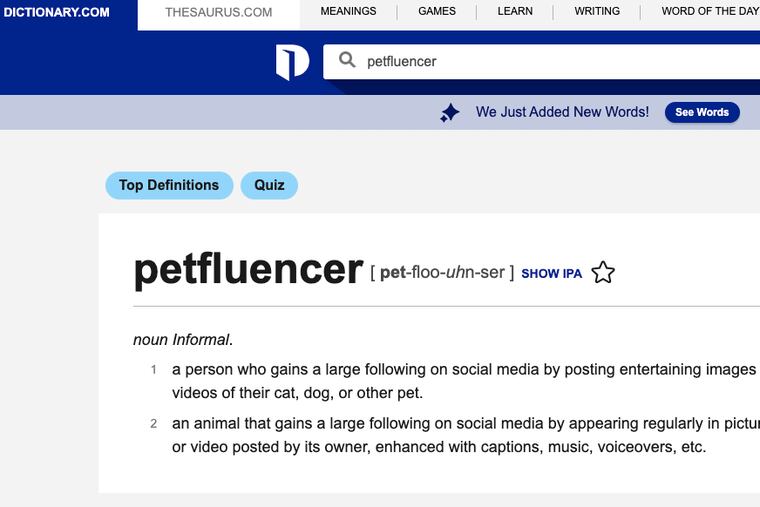From ‘woke’ to ‘queerbait’: Dictionary.com adds 300 new words
Dictionary.com has added over 300 new words, including hellscape and deadass, to reflect modern language the company announced Tuesday. Here's a look at what made the cut.

Well, folx, you’re going to want to see the new entries Dictionary.com has added to describe our collective hellscape. Deadass. And if you didn’t understand that, don’t worry — that’s what these new definitions are for.
Dictionary.com — the popular online dictionary that’s been running since 1995 — announced Tuesday that it added more than 1,500 new, updated, and revised words to its catalog. New entries include modern-day slang terms, like petfluencer, a person who gains a large following on social media by posting entertaining images or videos of their cat, dog, or other pet.
» READ MORE: Language scholars decided ‘-ussy’ was the word of 2022. Here’s what that means.
Other updates and revisions include the adjustment of the phrase anti-Semitism to antisemitism, to reflect the widely preferred form of the word. The word’s definition has not changed; it’s still described by the site as “discrimination against or prejudice or hostility toward Jews.”
In total, Dictionary.com announced there were:
313 new entries
130 new definitions for existing entries
1,140 revised definitions
Updating and adding to dictionaries is a common practice across the board. John Kelly, Dictionary.com’s senior director of editorial, said the site’s regular updates are meant to reflect how times change and language evolves.
“The sheer range and volume of vocabulary captured in our latest update to Dictionary.com reflects a shared feeling that change today is happening faster and more than ever before,” Kelly said. “Our team of lexicographers is documenting and contextualizing that unstoppable swirl of the English language.”
Dictionary.com says it uses a set of criteria to decide what words make the cut. Words are added when they’re:
used by a lot of people
used by those people in largely the same way
likely to stick around
are useful for a general audience
New entries added Tuesday include:
Bedwetting: exhibition of emotional overreaction, as anxiety or alarm, to events, especially major decisions or outcomes
Deadass: genuinely, sincerely, or truly; in fact
Digital nomad: a person who works remotely while traveling for leisure, especially when having no fixed, permanent address
Fan service: material added to a work of fiction for the perceived or actual purpose of appealing to the audience, used especially of material that is risque or sexual in nature
Folx: people; a variant spelling of folks (spelled with x not only as shorthand for the /ks/ sound, but also in parallel with other gender-inclusive spellings, like Latinx)
Forever chemicals: long-lasting chemicals, including PFAS and hydrofluorocarbons, used in the manufacture of common household items such as refrigerators, nonstick cookware, and flame-resistant furniture, that remain in the environment because they break down very slowly, and subsequently accumulate within animals and people
Hellscape: a place or time that is hopeless, unbearable, or irredeemable
Microdosing: the practice of taking or administering very small amounts of a psychoactive drug, such as cannabis, LSD, or psilocybin, to improve mood or enhance cognitive functioning, without hallucinogenic or other disorienting effects
Multisexual: noting or relating to a person who is sexually or romantically attracted to people of more than one gender, used especially as an inclusive term to describe similar, related sexual orientations such as bisexual, pansexual, omnisexual, etc.
Nearlywed: a person who lives with another in a life partnership, sometimes engaged with no planned wedding date, sometimes with no intention of ever marrying
Pinkwashing: an instance or practice of acknowledging and promoting the civil liberties of the LGBTQ+ community, but superficially, as a ploy to divert attention from allegiances and activities that are in fact hostile to such liberties
Queerbaiting: a marketing technique involving intentional homoeroticism or suggestions of LGBTQ+ themes intended to draw in an LGBTQ+ audience, without explicit inclusion of openly LGBTQ+ relationships, characters, or people
Rage farming: the tactic of intentionally provoking political opponents, typically by posting inflammatory content on social media, in order to elicit angry responses and thus high engagement or widespread exposure for the original poster
Self-coup: a coup d’état performed by the current, legitimate government or a duly elected head of state to retain or extend control over government, through an additional term, an extension of term, an expansion of executive power, the dismantling of other government branches, or the declaration that an election won by an opponent is illegitimate
Talmbout: a phonetic spelling representing an African American Vernacular English pronunciation of talking about, used especially online
Trauma dumping: unsolicited, one-sided sharing of traumatic or intensely negative experiences or emotions in an inappropriate setting or with people who are unprepared for the interaction
Woke: of or relating to a liberal progressive orthodoxy, especially promoting inclusive policies or ideologies that welcome or embrace ethnic, racial, or sexual minorities
WOC: abbreviation. woman of color: a woman of color; a nonwhite woman